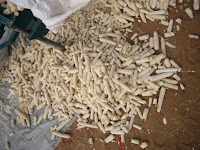One of our few mechanised processes is shelling maize cobs, a similar principal to a stationary combine harvester, seeds are bagged and the cobs stored for cattle feed.
 |
| Shelled cobs used for cattle feed |
 |
| Maize sheller |
Tobacco
Over 70% of Malawi's foreign earnings are from tobacco, it is grown by both large estates and small holders. Drying takes place in open sheds (burley) or in heated barns (flue cured). From April to September the leaves are transported in 100kg bales to auction floors in Mzuzu, Blantyre and Lilongwe. Following sale, the bales are trucked to Beira (Mozambique) and exported to the smokers of the world. Few Malawians can afford to smoke.
 |
| Tobacco auction floor |
 |
| Porters race to the floors |
We visited the auction floors in Lilongwe where 10,000 bales are sold daily. It was dusty, noisy and frantically busy. Much of the handling is done by sack barrow.
 | ||
| Electronic weighing |
Average price $1.72 per kilo
Burning
It is traditional to burn the fields after harvest. Much of the bush is set alight, the sparse regrowth of grass is soon parched and dry.
Picnic
We took Ophen, who looks after us at home, for a picnic on Funwe Farm, he was interested to see crops grown and processed on a large scale; he grows sufficient for his extended family in his small garden.
 | |||
This weekend is the Malawi yachting marathon up the west coast of the lake; we will wave as it passes our door.
T and I









